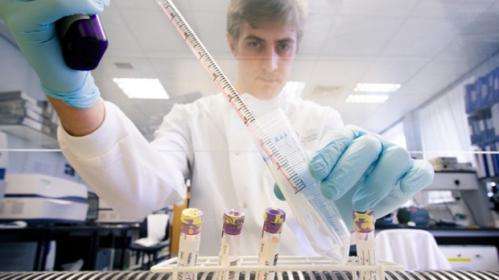New target for aggressive bladder cancer

An international team of scientists have discovered a faulty process in certain bladder cancers that could point to new ways to treat patients with an aggressive form of the disease.
The researchers focused on a more advanced stage of bladder cancer known as 'muscle-invasive' cancer, which means it has begun to spread to the muscle layer of the bladder.
Treatment for muscle-invasive bladder cancer can involve surgery to remove part or all of the bladder. But in around one in two people who have surgery, the cancer can return at a later date.
Researchers from the Institut Curie in France analysed genetic data on invasive bladder tumours from nearly 400 patients.
They discovered a subgroup of these cancers where a particular pathway, known as the EGFR pathway, was hyperactive. This subgroup made up about a quarter of the muscle-invasive bladder tumours analysed.
One of the roles of EGFR is to control the growth and development of cells. Drugs that target EGFR, known as EGFR inhibitors, have already been developed to treat breast, lung and bowel cancers.
Publishing their findings in the journal Science Translational Medicine, the team found that in mice with this subgroup of bladder cancer, treatment with EGFR inhibitors slowed the growth of tumours.
The team, which includes experts from the University of York, believe the findings could help identify which patients might benefit from this treatment in the future.
Professor Nick James, a Cancer Research UK expert in bladder cancer who was not involved in the research, said: "Pinpointing who may benefit from potential new treatments is really important. This interesting study builds on existing evidence suggesting that targeting EGFR may help treat bladder cancer.
"My team are testing the idea of combining drugs that target EGFR with radiotherapy to treat muscle-invasive bladder cancer as part of a Cancer Research UK-funded clinical trial called TUXEDO. And this latest study adds further weight to the evidence supporting this approach."
Around 10,300 new cases of bladder cancer are diagnosed in the UK each year. And around one in 10 bladder cancers will have started to spread into the muscle layer when they are diagnosed.
Professor Jenny Southgate, Director of the Jack Birch Unit for Molecular Carcinogenesis, in the Department of Biology at York and an author on the study, said: "This research represents a true hope for treatment of this aggressive group of bladder invasive cancers for which there are very limited therapeutic options."
More information: Rebouissou S, et al. (2014). "EGFR as a potential therapeutic target for a subset of muscle-invasive bladder cancers presenting a basal-like phenotype," Science Translational Medicine, 6 (244) 244ra91 . DOI: 10.1126/scitranslmed.3008970















